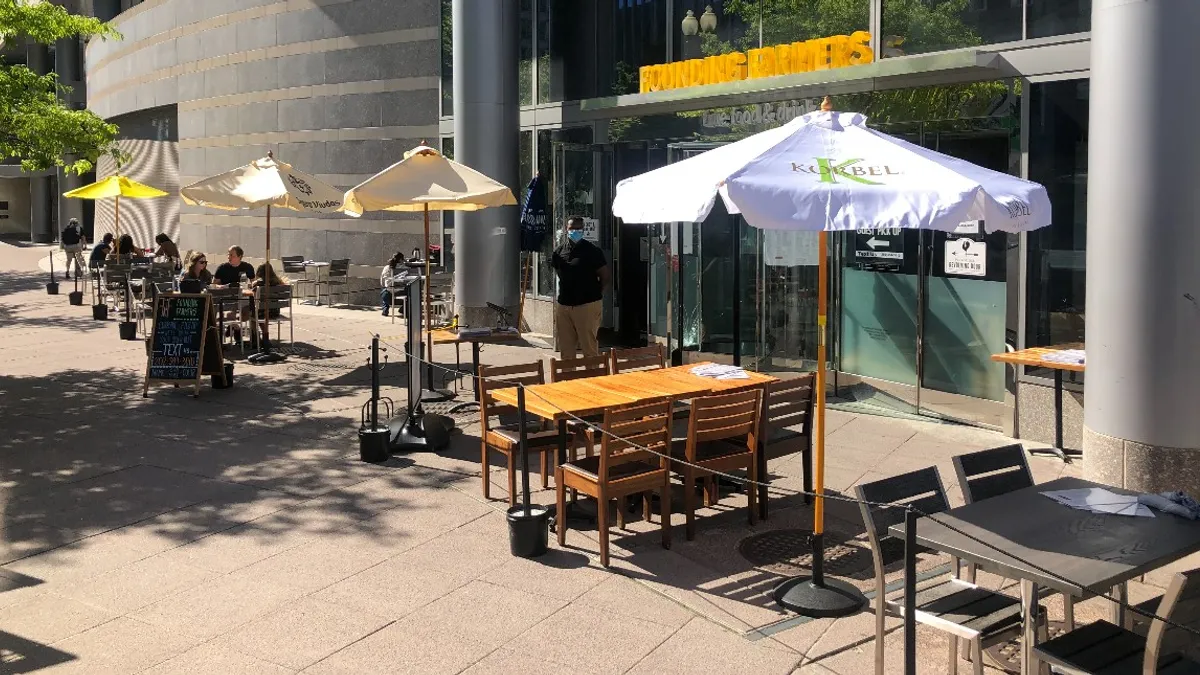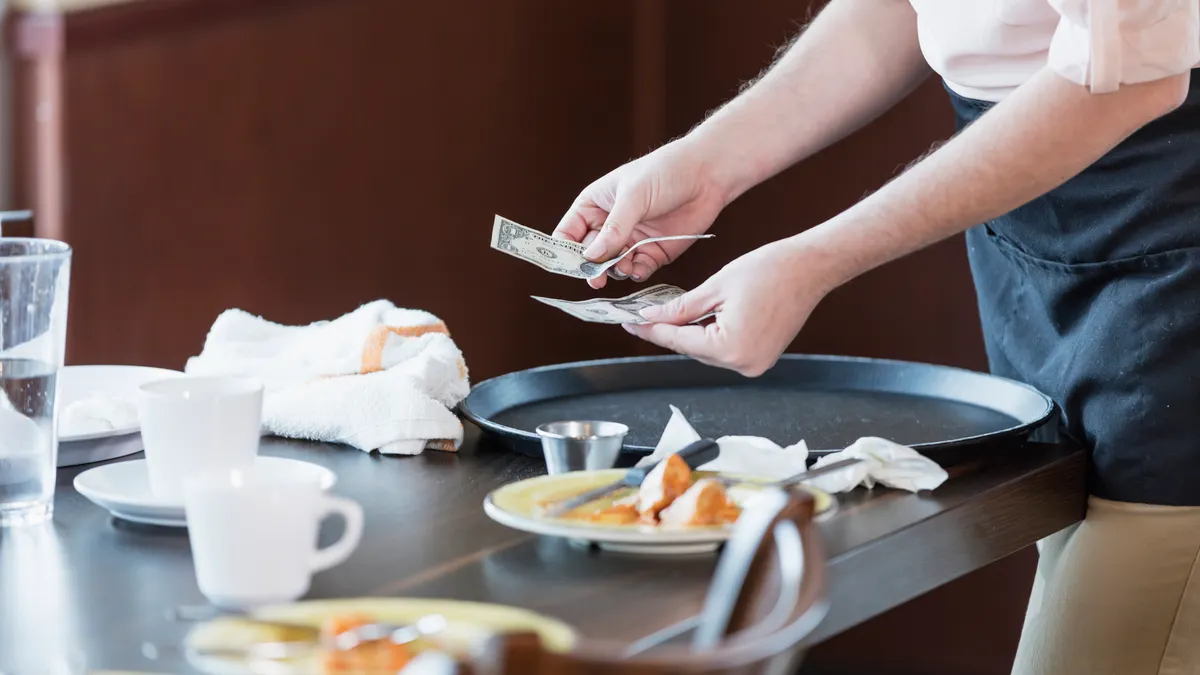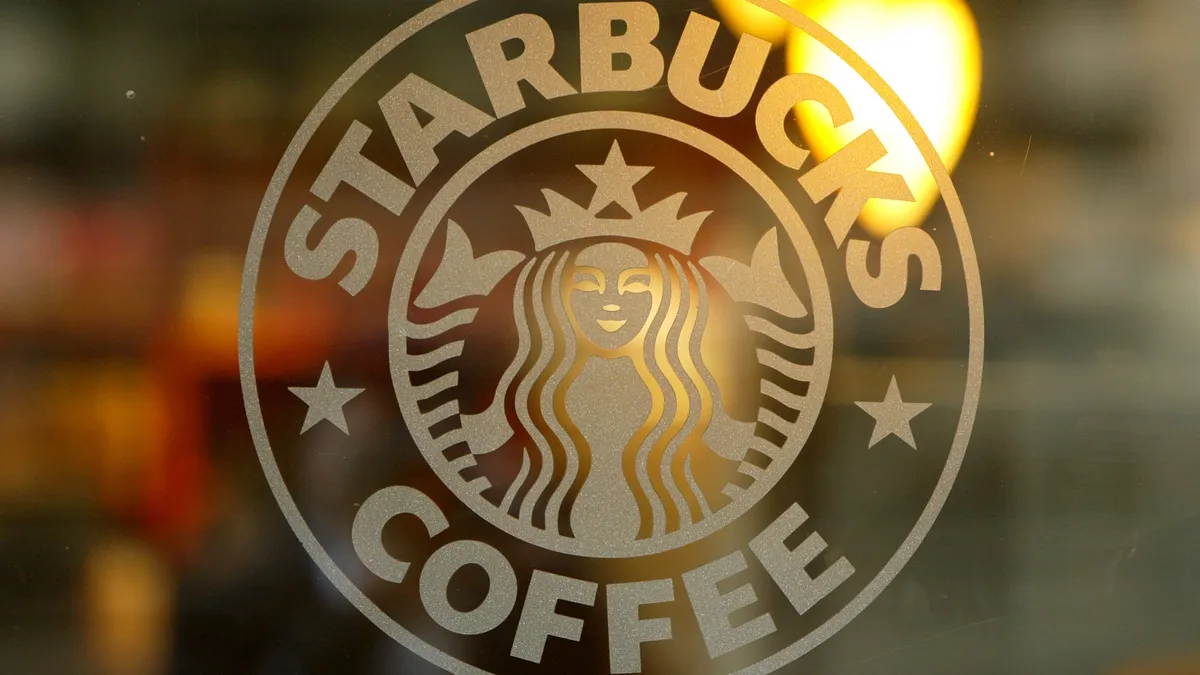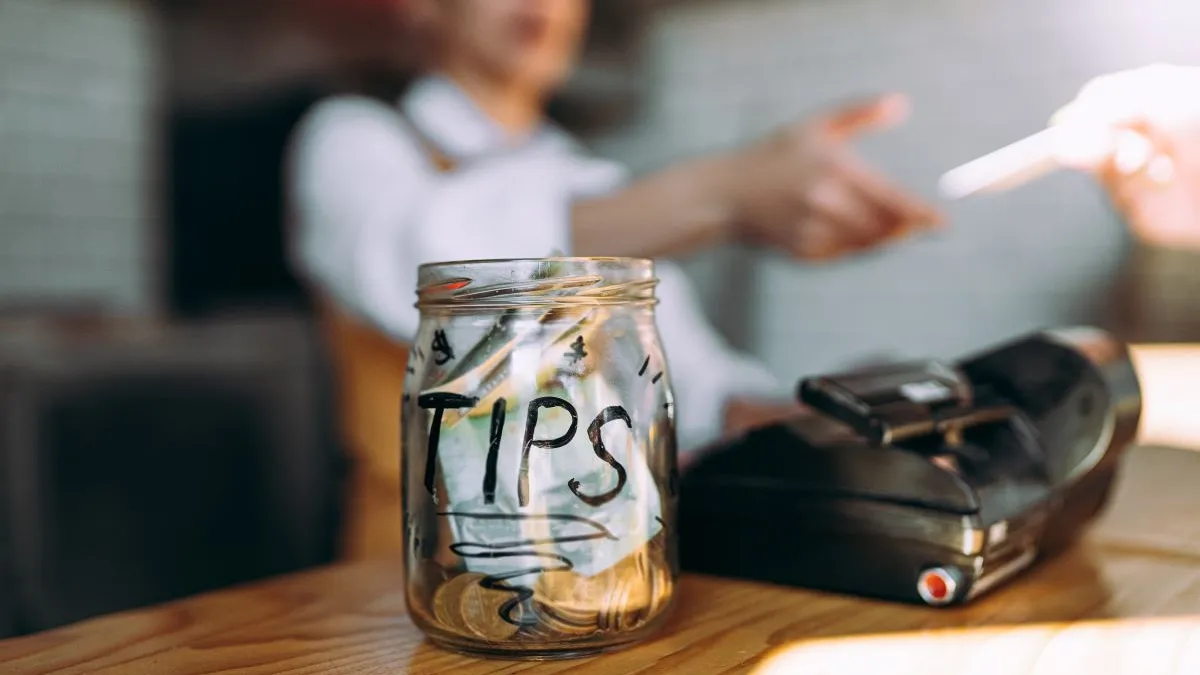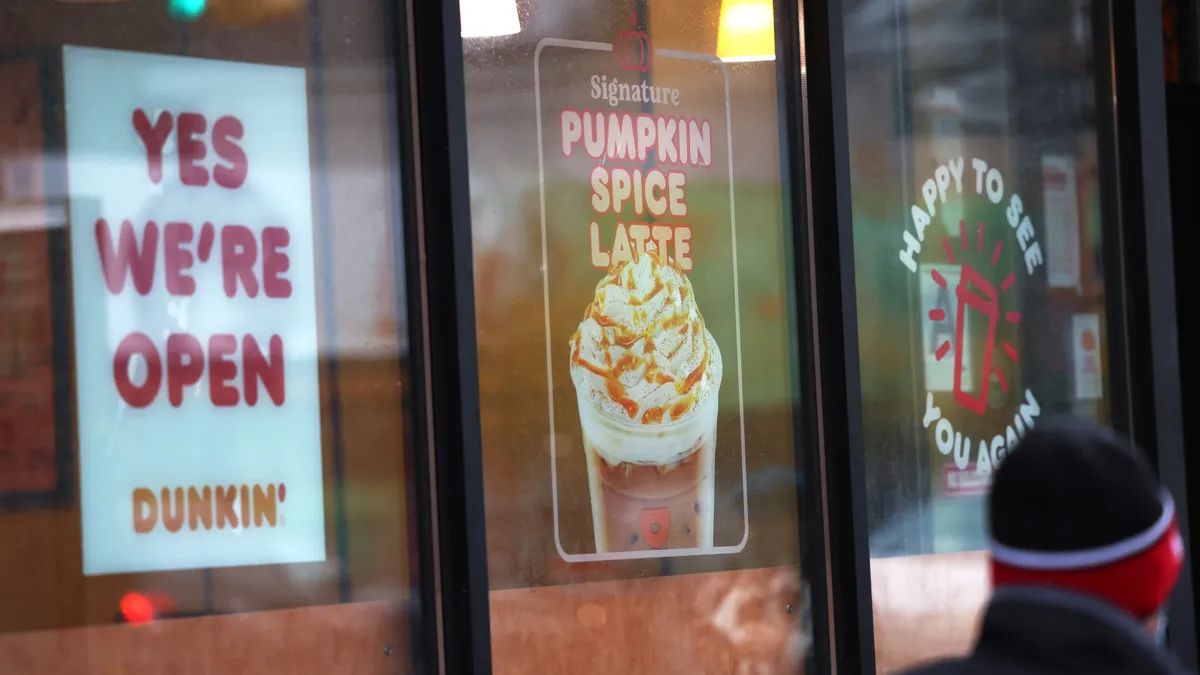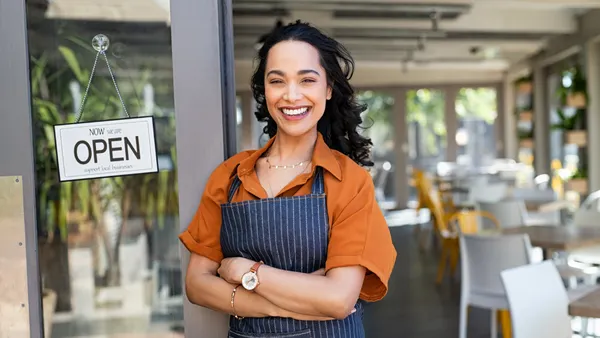As protests against systemic racism crowded the streets in downtown Washington, D.C. the last weekend of May, Glenn Edwards was glued to his TV screen. Throngs of people peacefully chanted by day, but as evening hit, many businesses were vandalized and looted. Then, the managing director of LEON USA saw one of his restaurant storefronts flash on screen. It had been broken into, glass shattered, and people were running in and out of the building.
“I was like what do you do? So I decided to go to sleep and just be ready to go in the next morning and pick up the pieces,” Edwards told Restaurant Dive.
Two of LEON’s three D.C. locations were heavily damaged. The store that was most vandalized was already closed because of the novel coronavirus crisis. This restaurant, situated just a few blocks away from the White House at 14th and I Street Northwest, had all of its windows smashed. Its L Street and Connecticut NW location had some furniture and IT equipment stolen, Edwards said, adding that the damage was superficial and that the location is still structurally sound. The British fast food chain had planned to reopen the location with a limited menu that same week, but decided to board up its store instead.
LEON spent last Monday, June 1, cleaning up its damaged restaurants, but chose to stay closed the following Tuesday and Wednesday because of the city’s mandatory curfews, which have since lifted. Now, the chain’s L and Connecticut location — the only D.C. LEON that had operated throughout the pandemic — is offering lunch for pickup and delivery once again.
But the restaurant is operating against an utterly alien landscape, one even more surreal than the once-bustling downtown’s silence and empty streets amid COVID-19 restrictions.
“I was walking the streets of the District yesterday and there is so much military presence, and I see on the news now that they are putting more fencing up near the White House,” Edwards said on June 4. “We’re taking it one day at a time at the moment and are just being very cautious.”
Disruption from protests could push urban restaurants even further back from projected recovery, Datassential managing director Jack Li said during the Restaurant Rise virtual conference last week, but added that it’s unclear whether this will have a long-term impact.
Restaurants in cities have been hit hard nationwide by COVID-19 disruptions, especially in markets like the D.C. area that have higher populations of workers than residents, according to Datassential research. Eleven percent of urban restaurants are temporarily closed and 3.4% are permanently closed compared to suburban businesses, 7.2% of which have closed temporarily and 3.7% have shuttered for good.
West McLean, Virginia — about 10 miles from D.C.’s outskirts — has roughly 23,000 residents compared to 73,000 workers and a restaurant closure rate of 37.5% compared to the U.S. average of 11.5%, according to Datassential. Dozens of D.C. restaurants have shuttered since dining rooms closed in March, and it’s possible that the city’s demonstrations could further destabilize struggling businesses if they interrupt diner foot traffic.
Impacts of downtown protests are far reaching
Radici Market, an Italian fast casual restaurant and grocery in D.C.’s Eastern Market neighborhood — about three miles away from where the biggest protest crowds gather — had its patio opening plans upended by the protests and subsequent curfews despite its distance from downtown.
Owner Bridget Sasso opened the restaurant’s outdoor seating on Friday, May 29 as part of Phase 1 of D.C.’s reopening, and was planning to launch a special evening menu for patio dining to complement Radici’s normal offerings.
For the first few days, Radici sat about 40 to 50 diners each day on its patio, which had reduced its seats from 36 to 20 to comply with social distancing requirements. But the quaint, picturesque market street — one that reminded Sasso of the small, European villages she fell in love with when she lived in Italy for eight years — is now far from inviting, she said.
“Businesses all around me are either shut down due to [COVID-19] and not reopening, or have boarded up their windows so it looks, honestly, very frightening and it’s almost like a third-world country if you're sitting out on our patio,” Sasso told Restaurant Dive. “There are some regulars that are coming in that feel comfortable sitting outside, but we haven't been able to properly roll out [the evening menu].”
As the protests continued last weekend and the city put curfews in place, fewer diners have stopped to linger at Radici’s outdoor tables. Sasso realized that her vision of diners leisurely eating caprese salads and sipping cocktails on the patio, which the restaurant had just received a permit for, won’t be happening anytime soon.
"Businesses all around me are either shut down due to [COVID-19] and not reopening, or have boarded up their windows so it looks, honestly, very frightening and it’s almost like a third-world country if you're sitting out on our patio."

Bridget Sasso
Owner, Radici Market
“It has always been my intention since I opened the business… that we would actually have evening hours where we would do a more defined menu, and it has not happened over the years,” Sasso said. “They tore down a school that was across the street from us and built [these] enormous apartments and office buildings and everything, so we haven't been properly able to use our patio, in the last several years anyway, because we have construction and there was noise and there was dust and dirt… and it just wasn't conducive to a dining out situation.”
So far, Sasso says reopening her patio under Phase 1 has been only “marginally helpful” to her sales, which have dropped 40% since the start of dining room closures. At the end of each day, Sasso and her team tie up their tables, chairs and umbrellas to avoid theft and set them back up each morning, a cumbersome process that feels futile when so many regulars have stayed away due to COVID-19 concerns or have gone to the country for extended stays, she said.
“I'm afraid that small business is forever changed, that the only people that are going to be able to afford rent and afford people and afford anything going forward are going to be big businesses, which I think is cringe-worthy. So I hope we can all make it out of this,” Sasso said.
D.C.-based Farmers Restaurant Group began opening its patios to outdoor dining on May 29, two months after it laid off 1,100 employees. Everything seemed to be going well. Customers were returning and employees and guests appeared to be happy.
“It was great and I think it brought a lot of energy and joy to the staff and the guests,” Dan Simons, co-founder of Farmers Restaurant Group, told Restaurant Dive. “I think the guests have been so happy just to sit outside in the sun and have a cocktail.”
But on May 30, a window was smashed at its Founding Farmers location on Pennsylvania Avenue, Simons said. An employee was inside at the time, but she was unharmed. Looters didn’t get inside this location, but the next day, nearby sister restaurant Farmers & Distillers was broken into and hand sanitizer and alcohol bottles were stolen, bottles were smashed and a large 55-inch TV was destroyed. Glassware and an entryway plexiglass barrier that was installed for COVID-19 safety was also broken.
“The only thing I can call it is a setback because maybe in normal times I would have said it feels violating,” Simons said. “But I think everybody is realizing that you have to really think about the adjectives you put on your own difficulties. Nobody’s kneeling on my neck choking me so I can’t breathe. Nobody I love is on a ventilator right now. I think this kind of damage and the difficulties of operating is a challenge.”
Boarding up DC restaurant after #DC #GeorgeFloydProtests pic.twitter.com/vWfeCKMtms
— Joy Malbon (@JoyCTV) May 31, 2020
On May 31, the Restaurant Association of Metropolitan Washington reportedly encouraged restaurants across the city to pause service — especially on patios or other outdoor spaces — to avoid risk of looting and damage.
But just as quickly as Farmers & Distillers sustained damage, employees rallied and cleaned up the restaurant so that it could reopen three days later.
“It’s really motivating when you have a team that you want to perform for and a community you want to try and feed so I’m feeling pretty motivated,” Simons said.
And customers continue to support Farmers restaurants.
“The camaraderie from the guests in the community, you know, to show up to sit at a patio table in front of a boarded up window, and … spend their time and their money and their energy with us,” Simons said. “It's just awesome. That refusal to be kept down by the violence. And you know, when the sun's up and the sun is shining, and it's daytime, Washington, D.C. has been, you know, as wonderful as ever.”
Immigrant Food, a downtown fast casual restaurant located half a block from the White House, opened its patio on the first day it was permissible only to be asked to close by Golden Triangle, a business improvement district the restaurant is part of, owner Tea Ivanovic told Restaurant Dive.
The restaurant hasn’t been damaged, but its building’s windows are boarded up. Immigrant Food also canceled a series of live events, where immigrant singers and songwriters would perform at the restaurant on Instagram Live, out of respect for the protestors.
The restaurant supports the activism downtown, sharing the following statement with Restaurant Dive: “Our country is at a crossroads, and we at Immigrant Food stand in solidarity with the pain and hurt of communities of color that live every day with abuse and inequity... So, we echo the cry of the protesters: It’s Enough. Black Lives Matter.”
“It’s a triple hurdle for us because one, when we're a brand new restaurant that just opened its doors in November, we don't have the brand recognition of a restaurant that's been in business for longer,” Ivanovic said. “And then two is because we're a fast casual restaurant, we rely heavily on lunch traffic and because we're located downtown, our customers or professionals that are in offices that come for lunch or for happy hour after work. And since there's no offices, no foot traffic to speak of, of course our business has been very impacted by the coronavirus.”
Outdoor seating still provides opportunity
But not all D.C. restaurants have had their foot traffic impacted by the protests and looting.
Napoli Pasta Bar in Columbia Heights, for example, said that patio seating has been flourishing to the point that diners are becoming too comfortable and often need to be reminded to keep their masks on and practice social distancing, owner Antonio Ferraro told Restaurant Dive. The restaurant is also located in a more residential area away from the main thoroughfare of the protests, Ferraro said.
The return of outdoor dining has altered Napoli’s sales mix, lowering delivery and pickup transactions, which Ferraro said helps them retain money that would have been lost to third-party delivery fees. He is also happy that the return of patio service gives the restaurant — Ferraro’s first — an opportunity to put its best foot forward by providing the level of atmosphere and freshness that diners who order for delivery can’t replicate. Last week, Napoli’s patio seating was fully booked.
To be honest, 17th St. brunch looked like business as usual, just less people. At Agora, staff wore masks with face shields. People sitting on the patio did not wear masks. pic.twitter.com/7TIMx1wqAy
— Chelsea Cirruzzo ???? (@ChelseaCirruzzo) May 31, 2020
This is especially important to Ferraro because Napoli is so new to the D.C. restaurant scene. The Italian restaurant opened in 2018, and the team was eagerly awaiting a Washington Post review that Ferraro hoped would bring in droves of new customers. Unfortunately, the review ran the same week that Mayor Muriel Bowser announced COVID-19 dining room closures.
Still, Ferraro is encouraged by the level of foot traffic he has seen since opening his patio at reduced capacity.
“Weather permitting, it will definitely help the business,” he said.
To give restaurants more outdoor seating space since they are required to operate at reduced capacity, D.C.’s government has allowed restaurants to apply for free permits to use public space like sidewalks, alleyways and parking lots to seat extra guests. Reservations are mandatory for establishments that serve alcohol, but encouraged for all restaurants.
Similar legislation has been passed across the country in a bid to fast track restaurant recovery while still maintaining social distancing measures, but urban restaurants relying on expanded sidewalk seating to boost sales could be vulnerable to disruption from protests.
Operators juggle PPP as they adapt for a new future
As restaurants scramble to adapt to the changing tides of coronavirus restrictions, downtown demonstrations and an increasingly militarized police force patrolling the streets, they are also struggling to utilize Paycheck Protection Program funding properly so they don’t incur debt during this crisis period as well.
In this way, the capital is emblematic — though perhaps in extremes — of the dynamic environment that restaurants across the country are fighting to survive in.
Napoli received a PPP loan from the program’s second round of funding, and though Ferraro said the loan’s requirements — which will change as a result of the Payment Protection Program Flexibility Act that was signed into law last week — are challenging, it’s worth the risk.
“The changes they made to the requirements will help, definitely, but I would have taken [the money] no matter what, even if I had to give it back at 1% [interest]. Because right now if you go to the bank and ask for money, they won’t give you anything but 5%, 10% [interest loans],” he said. “We’re trying to bring the staff back. The problem is with unemployment… nobody wants to come back. I had a few people who decided they didn’t want to come back, they wanted to stay home and collect their money."
The PPP fixes extended the time period to use funds from two to six months, reduced the percentage of PPP funds used to spend on payroll from 75% to 60%, allowed restaurants that receive loan forgiveness to defer payroll taxes and delayed a June 30 deadline to rehire employees. But before these provisions were signed into law, many restaurants, including Farmers Restaurant Group, weren’t using the funds, feeling like it was “fool’s gold,” Simons said.
Having to pay back debt that would’ve accrued if the rules around PPP weren’t met would have been impossible, Simons said.
But even with the latest fixes, there are still a lot of challenges.
“We’re juggling several flaming knives that are all in the air at the same time,” Simons said. “The problem is everything needs a contingency. … What if the violence continues? What if the virus resurges?”
Part of that planning is becoming a more diversified food, beverage and hospitality provider, Simons said.
“I know what a pandemic can do. Once we get through this one, I’m not just going to stick my head back into the sand,” Simons said.
"We’re juggling several flaming knives that are all in the air at the same time,” Simons said. “The problem is everything needs a contingency. … What if the violence continues? What if the virus resurges?”

Dan Simons
Co-founder, Farmers Restaurant Group
During the pandemic, Farmers closed all of its dining rooms and served a reduced menu for takeout, delivery and curbside. As part of its move to diversify, Farmers created a market grocery business with over 1,000 items, such as prepared food, baked goods, products from the distiller and household goods.
“That has been sustaining us right now, but it’s a challenge to run both businesses,” Simons said.
For Radici — which has both a restaurant and grocery permit — preparing for changing diner behavior has also led the company to sell ingredients as groceries on its website, which complements its array of heat-and-eat pastas, sandwiches and deli items.
Napoli has taken a more drastic strategy pivot. Ferraro is currently planning a second restaurant location in Virginia, which was originally going to be the same format as Napoli, that it hopes to open in the next few months. But now with analysts projecting that takeaway and delivery will become a much more predominant sales channel for diners who are wary of eating among crowds and value the convenience of off-premise orders, the new venue will be a deli with grab-and-go pasta and sandwiches instead.
“I think for the next couple years that’s what it’s gonna be unless there is a vaccine or unless [cases] go down,” he said. “Now with these protests, I don’t know what’s gonna happen in two to three weeks. There could be a spike… that’s what scares me the most. If there are protests now and then everyone is sick again, that’s even worse.”
Julie Littman contributed to this report.



